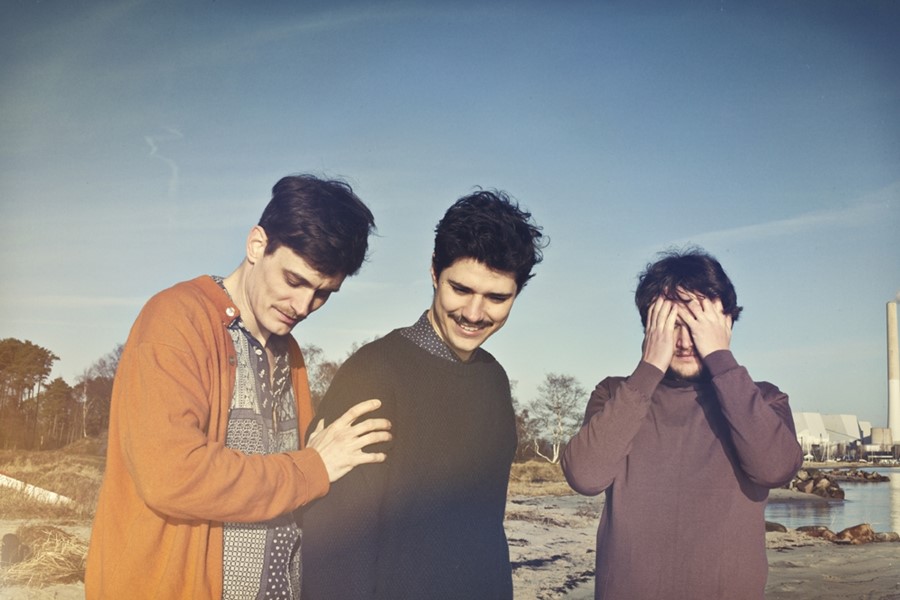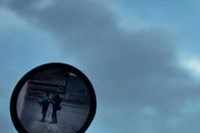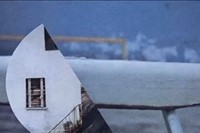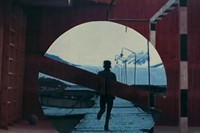Piramida, the much-anticipated fourth album from Danish indie band Efterklang, is named after a deserted Russian settlement on the island of Spitsbergen above the Arctic Circle...
Piramida, the much-anticipated fourth album from Danish indie band Efterklang, is named after a deserted Russian settlement on the island of Spitsbergen above the Arctic Circle. Once an outpost of a thousand residents, when its coalmine was closed down over a decade ago, it became a ghost town. Known for deeply textured, ethereal assemblages that push the boundaries of invention, the band have incorporated found sounds from this alien territory of desolation into their new album, set to be released on September 24. From their base in Berlin, singer Casper Clausen described to us the nine days he and Efterklang’s other core members Mads Christian Brauer and Rasmus Stolberg spent up near the Pole amid this monument to a decayed Soviet past gathering raw sonic material.
“It's impossible not to reflect on yourself and human beings when standing in the ruins of a place like Piramida,” said Clausen. “There's an instant bond to the people that lived there. On the one hand you see a magnificent, peaceful yet frightening landscape and on the other you see a strangely constructed reality within it. Then you look at your microphones, Gore-Tex clothing and canned food, and you understand not only the dilemma of the people that used to live in this town, but the dilemma of your own existence.”
So far north its seasons span midnight sun and polar night, Piramida is named for the angular mountain that looms over it. Its hulking industrial edifices now left to birds, the town’s full of relics to the past – from a Red October grand piano to the world’s most northernmost bust of Lenin. “It is full of signs of dreams, ideas and adventure,” said Clausen. “You can see it all pretty much as it was when the settlement was inhabited, as the cold climate extends the preservation of the buildings, but the place has turned into a lifeless fossil. The atmosphere is comparable to anywhere in the world where nature rules. The remains of the humans living indicate a different past, but the spirit of nature has taken over.”
"The atmosphere is comparable to anywhere in the world where nature rules. The remains of the humans living indicate a different past, but the spirit of nature has taken over."
Efterklang were first alerted to the creative possibilities of this extreme location when a film director proposed shooting a music video there for one of the tracks from their prior album Magic Chairs. “The project ended up being quite a complicated practical task for a music video, so we called it off, but the images and mystery of the place kept haunting us,” said Clausen. When the band began conceptualising the new album, they revisited the notion. “Our idea was to use a location as the starting point from where the songwriting could evolve. Piramida seemed the perfect place.”
Receiving the go-ahead for a project that to some less artistically minded authorities seemed an obscure fancy proved a bureaucratic headache. “We realised that getting the permission to work in an abandoned Russian coal mine in the far north isn't an easy task. It took a vast number of letters, faxes, emails and pure luck to pull this off.” Finally succeeding, the band collected more than 1,000 sound recordings from the town.
“We've always been curious about sounds,” said Clausen. “Ever since we started out, sounds and the discovery of new sounds have been crucial to the very first stage of the songwriting. That means the sound of Efterklang changes quite a bit from project to project. On this album it's the first time we've put that much focus on found sounds and their influence on the songwriting.” From metal spikes on an oil tank to ornate glass lamps and the abandoned piano, the debris of history’s past became unexpected instruments for a new, revivified form of monument. The band delicately synthesised and layered these field recordings with more conventional sonic elements, with Clausen’s own voice central in the buoyantly playful yet melancholy-tinged harmonic soundscapes that make up Piramida.
Efterklang travelled to the opposite hemisphere to launch the album with a concert in Australia’s Sydney Opera House in May. Continuing their tradition of fruitful collaborations with classical orchestras, they will following the album’s release play fifteen Piramida Concerts in European concert halls, including the Barbican in London on October 30 with the Northern Sinfonia. Drummer Budgie from Siouxsie and the Banshees is on the tour filling the gap left by Thomas Husmer, who left the band prior to its making of Piramida. Said Clausen of the upcoming UK tour date: “We'll present the music of the Piramida album in the largest scale, both musically and visually. But most of all we'll celebrate life with all of you Londoners.”
Piramida by Efterklang is released on September 24, and Efterklang: The Piramida Concert is at the Barbican on October 30.
Text by Carmen Gray



